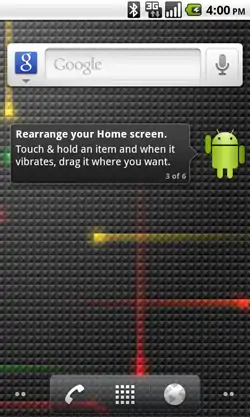| Version of the Android operating system | |
Screenshot  Android 2.2.3 home screen | |
| Developer | |
|---|---|
| OS family | Android |
| General availability | May 20, 2010[1] |
| Final release | 2.2.3_r2.1[2] / November 21, 2011 |
| Kernel type | Monolithic (Linux) |
| Preceded by | Android 2.0 "Eclair" |
| Succeeded by | Android 2.3 "Gingerbread" |
| Official website | developer |
| Support status | |
| Unsupported, Google Play Services support dropped since October 2014 | |
Android Froyo is the sixth version of Android and is a codename of the Android mobile operating system developed by Google, spanning versions between 2.2 and 2.2.3.[3] Those versions are no longer supported.
Details
It was unveiled on May 20, 2010, during the Google I/O 2010 conference. Google ceased sign-in support with a Google account for Android Froyo to Android Gingerbread on September 27, 2021.[4]
One of the most prominent changes in the Froyo release was USB tethering and Wi-Fi hotspot functionality.[5] Other changes include support for the Android Cloud to Device Messaging (C2DM) service, enabling push notifications, additional application speed improvements, implemented through JIT compilation[6] and displayed within applications as top-of-the-screen banners.
Features
2.2.0
New features introduced by Froyo include the following:
- Speed, memory, and performance optimizations.[7]
- Additional application speed improvements, implemented through JIT compilation.[6]
- Integration of Chrome's V8 JavaScript engine into the Browser application.
- Support for the Android Cloud to Device Messaging (C2DM) service, enabling push notifications.
- Improved Microsoft Exchange support, including security policies, auto-discovery, GAL look-up, calendar synchronization and remote wipe.
- Improved application launcher with shortcuts to Phone and Browser applications.
- USB tethering and Wi-Fi hotspot functionality.[5]
- Option to disable data access over a mobile network.
- Updated Market application with batch and automatic update features.
- Quick switching between multiple keyboard languages and their dictionaries.
- Support for Bluetooth-enabled car and desk docks.
- Support for numeric and alphanumeric passwords.
- Support for file upload fields in the Browser application.[8]
- The browser now shows all frames of animated GIFs instead of just the first frame.
- Support for installing applications to the expandable memory.
- Adobe Flash support.[9]
- Support for high-PPI displays (up to 320 ppi), such as four-inch 720p screens.[10]
- Introduced .asec file extension.
- Gallery allows users to view picture stacks using a zoom gesture.
2.2.1
- Bug fixes, security updates and performance improvements.
2.2.2
- Minor bug fixes, including SMS routing issues that affected the Nexus One.
2.2.3
- Two security updates.
See also
References
- ↑ "Android 2.2 and developers goodies".
- ↑ "Android Source". Google Git.
- ↑ Lead, Xavier Ducrohet, Android Sdk Tech (May 20, 2010). "Android 2.2 and developers goodies. | Android Developers Blog". Android 2.2 and developers goodies. | Android Developers Blog. Retrieved December 4, 2015.
{{cite web}}: CS1 maint: multiple names: authors list (link) - ↑ Pollack, Zak (July 26, 2021). "Sign-in on Android devices running Android 2.3.7 or lower will not be allowed starting September 27". Google. Retrieved August 2, 2021.
- 1 2 Sorrel, Charlie. "Android 2.2 'Froyo' Features USB, Wi-Fi Tethering". WIRED. WIRED. Retrieved December 4, 2015.
- 1 2 "EXCLUSIVE: AndroidPolice.com's Nexus One Is Running Android 2.2 Froyo. How Fast Is It Compared To 2.1? Oh, Only About 450% Faster". Android Police. Retrieved December 4, 2015.
- ↑ "EXCLUSIVE: Unofficially Confirmed Froyo Features, Post-Day-1 Of Google I/O [Google I/O Blitz Coverage, Day 1]". Android Police. May 20, 2010. Retrieved December 4, 2015.
- ↑ "Issue 2519 - android - Browser should support file uploads (input type="file") - Android Open Source Project - Issue Tracker - Google Project Hosting". code.google.com. Retrieved December 4, 2015.
- ↑ "Google's Andy Rubin on Everything Android". Bits Blog. April 27, 2010. Retrieved December 4, 2015.
- ↑ "Supporting Multiple Screens | Android Developers". developer.android.com. Retrieved December 4, 2015.
External links
 Media related to Android Froyo at Wikimedia Commons
Media related to Android Froyo at Wikimedia Commons- Official website
